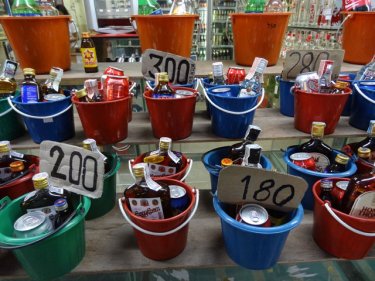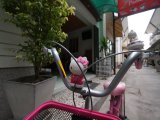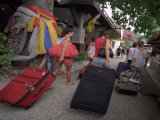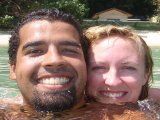PHUKET: Fresh revelations about insecticide being the cause of the deaths of Canadian sisters Audrey and Noemi Belanger should force authorites in Thailand to release whatever information they are holding.
It's been three months since Audrey, 20, and Noemi, 26, died a horrible death from a toxic substance while holidaying on the popular tourist destination of Phi Phi, just a ferry ride from Phuket.
Phuketwan yesterday revealed that an investigating police officer said the sisters' bodies contained insecticide. By day's end, a Canadian news organisation confirmed that an official autopsy report names DEET, a ''potentially neurotoxic mosquito repellent.''
How the chemical got into the bodies of the sisters has yet to be established, but the CBC television report suggested that the poison was most likely in a ''euphoria-inducing cocktail.''
Cocktail? Well, not quite. It's the habit of Phi Phi visitors, mostly 20-somethings out for a good time, to drink their cocktails by the bucketful - literally - on Phi Phi when enjoying their fun and making the round from venue to venue.
What goes into the individual person's bucket depends on their taste, as does the size of the bucket. The contents are usually sucked through a straw.
The CBC report is correct, however, in that some versions of the buckets could contain ''cough syrup, Coke, DEET and ground up kratom leaves, which are a mild narcotic indigenous to Thailand.''
Buckets, as Phi Phi residents know, can hold virtually any liquid. Local hospital doctors and nurses vouch for the dangerous outcome of some big nights out with buckets.
Police said that after the sisters' bodies were discovered by a maid in a resort room in June that they found no signs of foul play. But that can hardly remain true if what the sisters were drinking a couple of nights earlier was contaminated with a killer chemical.
The deaths of the sisters has inevitably been linked to the still-unsolved deaths of American Jill St Ongle and Norwegian Jule Bergheim on Phi Phi in 2009 and to a series of deaths in the Thai city of Chiang Mai last year.
Bad publicity forced Thai health authorites to reveal as much as they could about the death of New Zealander Sarah Carter, 23, and the other Chiang Mai victims.
Pressure to absolve Phi Phi's tourism industry is likely to now force the Thai authorities to be just as open about the four deaths on Phi Phi, which is one of the jewels in the crowd of Thai tourism.
A CBC journalist based yesterday's television report on a sighting of the first autopsy report, in Bangkok.
A second autopsy is said to have take place on the Belangers in Montreal, before the sisters were buried, but the final results from that examination could take months.
While it's possible that the sisters could have consumed the insecticide in a drink, it's also possible that the chemical was ingested in some other way.
All options remain open - unless the pathologists who performed the autopsy and the extensive tests that usually follow are able to say with certainty how the pesticide entered the sisters' bodies.
Any judgements in the case of the Belanger sisters are likely to be greeted by a call to reopen the casebooks on the earlier Phi Phi and Chiang Mai deaths.
The appalling tragedy of the Belanger sisters highlights yet again the need for Thai authorities to act fast and with absolute transparency in probing the deaths of tourists in Thailand.
Speedy action and updating reports on the deaths of all foreigners in Thailand was promised after the Chinag Mai fatalities. The Belanger case proves an international-quality response has yet to be delivered.
Lack of information from Thai officials has now cast a pall of doubt over Phi Phi tourism. It should be lifted as fast as possible by the country's health experts.
The Belanger sister's father, Carl, forced to wait three months for information that has now come not from official sources but via Phuketwan and CBC, is upset.
He told another Canadian news outlet that he would like a more thorough investigation, especially considering the similar deaths on Phi Phi in 2009.
Mr Belanger told QMI Agency in June that he deplored the way Thai authorities handled the case, calling police work ''corrupt'' and ''rotten.''
Mr Belanger said then that the investigation took too long and there was little communication between Thai authorities and the family.
Since the reports about the insecticide, Mr Belanger has told The Canadian Press that he is convinced his daughters did not know what they were consuming.
He says two other young people from Quebec spent time with his daughters and told him they all drank alcohol together.
Mr Belanger now wants a full inquiry. So do we.



















This report is a prime example of why free and independent media is crucial to any society that aspires to be a democracy.
It will hopefully result in increased public safety and at the very least, give a warning to those heading out to Phi-Phi, Ko Phangngan etc of the possible dangers.
I'm sure it's also a relief to the victims families to see someone is pressuring the authorities to take responsibility. Their stall tactics are well known to anyone living in Thailand.
However knowing how the tourism reputation is protected at any cost, including covering up deaths, I would not be surprised if the authorities still refuse to be open and upfront.
If it is confirmed that tourists are being poisoned in Thailand, either accidentally or on purpose, and above all that the authorities knew this but did not release the information so travellers could take precautions, one can expect a huge backlash from the international community.
Suddenly all the confirmed and unconfirmed stories about spiked drinks in Phuket and elsewhere gain a lot more credibility too.
What is painfully lacking is a proper and professional, unbiased response from the authorities.
Once again - an international tourist destination with total disregard and apparent contempt for international safety and justice standards.
To imagine things can continue as usual by just pretending everything is ok and nothing bad happened is a pipe dream.
Poisoned, burned to death, hit by a speed boat etc. When is anyone going to be held responsible ?
Words like "Patong safety zone" have a distinctly hollow ring to them in light of the recent incidents and accidents.
Window dressing does NOT cut it anymore.
Posted by Andrew on September 1, 2012 11:42